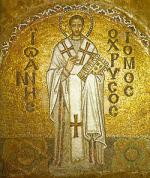Disable ads!
John Chrysostom
Part of a series on Christian mysticism Mysticism Catholic spirituality Theologies · Philosophies Apophatic Ascetical Cataphatic Hellenistic Mystical Neoplatonic Practices Asceticism Contemplation Hesychasm Lectio Divina Meditation Monasticism Theosis People by era or century Early Christianity Origen Gregory of Nyssa Pseudo-Dionysius Desert Fathers Paul of Thebes Anthony the Great Arsenius the Great Poemen Macarius of Egypt Moses the Black Syncletica Athanasius John Chrysostom Hilarion John Cassian 11th · 12th Bernard of Clairvaux Guigo II Hildegard of Bingen Hadewijch 13th · 14th Dominican Dominic de Guzmán Franciscan Francis of Assisi Anthony of Padua Bonaventure Jacopone da Todi Angela of Foligno English Richard Rolle Walter Hilton Julian of Norwich Flemish Beatrice of Nazareth John of Ruysbroeck German Meister Eckhart Johannes Tauler Henry Suso Female Beatrice of Nazareth Bridget of Sweden Catherine of Siena 15th · 16th Spanish Ignatius of Loyola Francisco de Osuna John of Ávila Teresa of Ávila John of the Cross Others Catherine of Genoa 17th · 18th French Pierre de Bérulle Jean-Jacques Olier Louis de Montfort Others María de Ágreda Anne Catherine Emmerich Veronica Giuliani Francis de Sales 19th Catherine Labouré Mélanie Calvat Maximin Giraud Bernadette Soubirous Conchita de Armida Luisa Piccarreta Mary of the Divine Heart Thérèse of Lisieux Gemma Galgani 20th Pio of Pietrelcina Maria Valtorta Therese Neumann Marthe Robin Adrienne von Speyr Alexandrina of Balazar Faustina Kowalska Sister Lúcia of Fátima Thomas Merton Contemporary Papal views Aspects of meditation (Orationis Formas, 1989) Reflection on the New Age (2003) v t e John Chrysostom (/ˈkrɪsəstəm, krɪˈsɒstəm/; Greek: Ἰωάννης ὁ Χρυσόστομος), c. 349 – 407, Archbishop of Constantinople, was an important Early Church Father. He is known for his preaching and public speaking, his denunciation of abuse of authority by both ecclesiastical and political leaders, the Divine Liturgy of St. John Chrysostom, and his ascetic sensibilities. The epithet Χρυσόστομος (Chrysostomos, anglicized as Chrysostom) means "golden-mouthed" in Greek and was given on account of his legendary eloquence. The Orthodox and Eastern Catholic Churches honor him as a saint and count him among the Three Holy Hierarchs, together with Basil the Great and Gregory Nazianzus. He is recognized by the Eastern Orthodox Church and the Catholic Church as a saint and as a Doctor of the Church. Churches of the Western tradition, including the Roman Catholic Church, some Anglican provinces, and parts of the Lutheran Church, commemorate him on 13 September. Some Lutheran and many Anglican provinces commemorate him on the traditional Eastern feast day of 27 January. The Coptic Orthodox Church of Alexandria also recognizes John Chrysostom as a saint (with feast days on 16 Thout and 17 Hathor). Among his homilies, eight directed against Judaizing Christians are considered by some to have had an impact on the development of Christian antisemitism.
 Read more on wikipedia.org Read more on wikipedia.org
 All quotes by John Chrysostom All quotes by John Chrysostom
 Edit Edit
|

|
|
|
|
|
Background photo by Giuliana
|